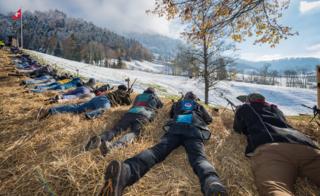Gun-loving Swiss vote on tightening laws for EU
Swiss voters go to the polls on Sunday to decide whether to tighten up their gun laws to conform with European Union regulations.
Switzerland is not a member of the EU, but is part of the Schengen open-border treaty.
After the 2015 Paris attacks in which 130 people died, the EU issued Schengen members with new restrictions on automatic and semi-automatic weapons.
The EU hopes the rules will help police in Schengen countries.
These states now work together and share information on a daily basis, to establish where weapons used in crimes came from.
But the proposals have raised hackles in Switzerland, which has a long, and for many Swiss, proud tradition of gun ownership. After Swiss men complete their obligatory military service, they are permitted to keep their assault rifles.
There are gun clubs in every town and village, and target-shooting is a hugely popular sport.
Swiss law does require gun owners to have a permit, but getting one is relatively easy.
Local authorities need to see an applicant’s identity papers, address and proof there is no record of violent crime. Guns can be sold on privately without informing the authorities, provided a record of sale is completed.
Hands off our guns
Support for this relaxed approach is, says Beat Bösiger, a farmer and parliamentary candidate for the right-wing Swiss People’s Party, all based on government trust in gun owners, and the responsibility of the gun owners themselves.
“There is no reason for these new laws,” he said. “It would be a breach of trust. We Swiss, we know how to handle weapons.”
Mr Bösiger has a point. Despite the millions of weapons in homes across Switzerland, the overall crime rate is low.
Gun crime is higher in Switzerland’s neighbours. Nevertheless, there are some indicators that easy access to weapons is not entirely positive for Switzerland.
For decades Swiss women’s groups have pointed to the risk of guns in cases of domestic violence.
A worker at a women’s shelter told the BBC that it was not uncommon during domestic rows for a man to remind his wife or girlfriend “I have a gun and I’ll go and get it”.
And Switzerland’s rate of gun suicide, at 2.74 per 100,000, is the second highest in Europe.
Gun control supporters claim the fact that guns are to hand at home in moments of desperation leads to suicides that could otherwise have been prevented.
“The new restrictions are not about destroying Swiss tradition or culture,” insisted Ronja Jansen of pro-disarmament group Switzerland without an Army.
“It’s about bringing Switzerland to a safer place, where there is not as much gun violence as there is now. There are a lot of guns in Switzerland in private homes, and that is a real problem.”
Tricky EU relations
The European Union’s aim, though, is less about Switzerland’s high rate of gun suicide and more about preventing a future attack such as the Bataclan nightclub massacre in Paris, in which 90 people were murdered.
What the EU wants:
Switzerland has an estimated 2.3 million guns, in a population 8.5 million.
That figure could be much higher, as only guns acquired since 2008 (when Switzerland first joined Schengen) have to be registered.
The EU wants to ensure that automatic and semi-automatic weapons are either banned or heavily restricted, and that each owner of such a weapon, and the weapon itself, is known to police across Europe.
For non-EU member Switzerland, the idea of Brussels interfering in hallowed Swiss gun traditions is awkward.
The Swiss government wants voters to back the EU directive, but it has also lobbied Brussels hard for exemptions which might make it more palatable. Those semi-automatic army assault rifles, for example, will still be allowed at home if Swiss militia soldiers want them.
The government argues that gun lovers won’t notice the new regulations, while at the same time Switzerland will have preserved its membership of Schengen.
Business leaders say Switzerland’s Schengen open borders have been good for the economy. Police point to data-sharing on crime in the Schengen information system.
Immigration officials warn that if Switzerland votes No and drops out of Schengen, it will lead to a spike in asylum requests from people turned away by neighbouring countries.
That is because it would no longer be covered by the rules under which asylum seekers can only apply to one EU member state for protection.
Switzerland’s political establishment is united in support of the EU’s restrictions, and latest opinion polls show voters may go along with them.
The deciding factor in this vote is likely to be Swiss women, for decades the most vocal campaigners in favour of gun control,.
“The most important point is not that we are changing this law because of the EU,” says Ronja Jansen, “but that we are taking an important step towards safety in Switzerland itself.”
Source: Read Full Article



